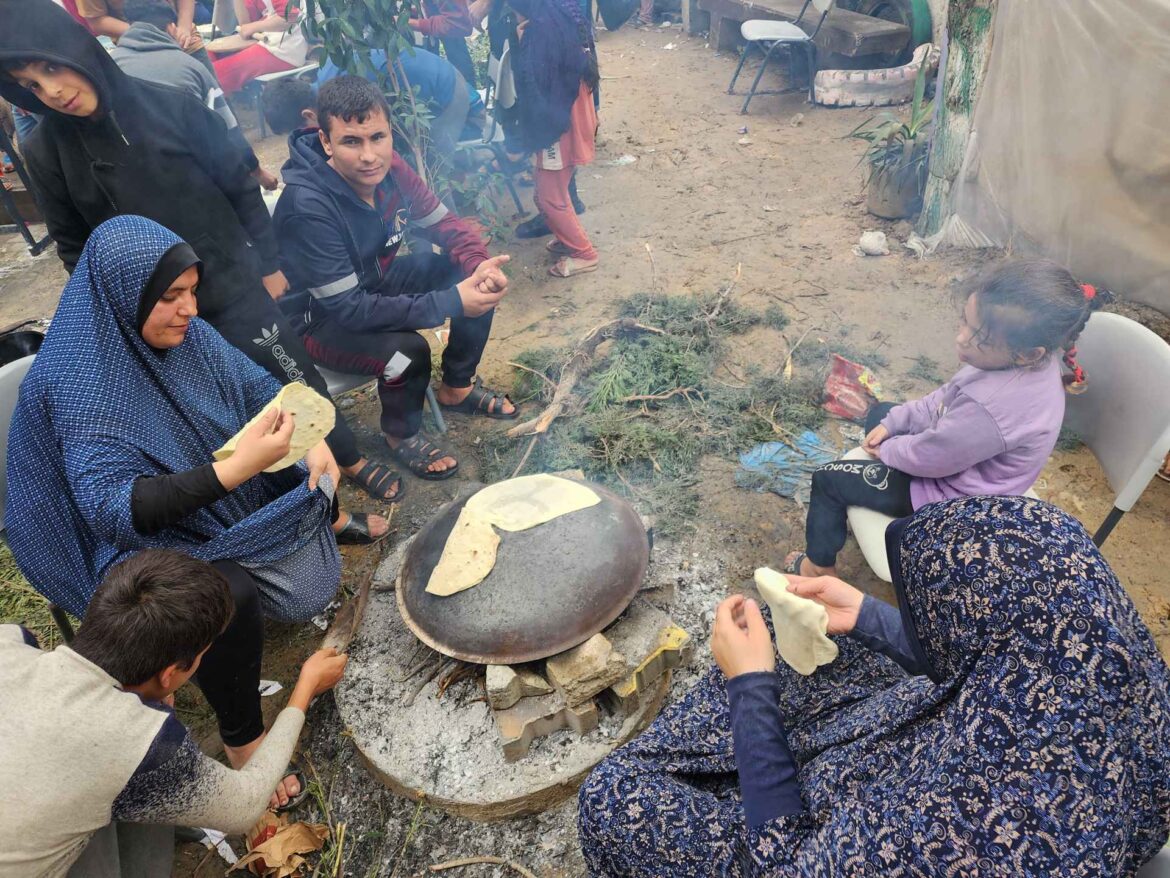The state of hunger is worsening among more than two million displaced people in the Gaza Strip as the fourth month of Israel’s war on the Strip enters, according to what the British newspaper “Financial Times” monitored, amid international warnings that famine is looming on the horizon.
United Nations Secretary-General Antonio Guterres said last week that the specter of famine haunts the people of Gaza, along with diseases, malnutrition and other health threats.
The British newspaper quoted a displaced woman from the northern Gaza Strip to Rafah, named Amal Muhammad, as saying that after she was chasing her young children around their house to finish dinner, they became in dire need of food, but she could barely feed them.
The woman added that she now shared a crowded tent with her relatives and said: “We pretend in front of the children that we are not hungry, or too busy, to eat.”
Prices are rising
According to Amal, the prices of food and firewood used for cooking have risen significantly, and eating meat has become a “dream” and adults have reduced their food intake so that children can eat it. She says: “We have all lost weight.”
Gazans have become almost completely dependent on foreign aid brought in through the only two entry points, Rafah on the border with Egypt, and Kerem Shalom on the Israeli border.
Commercial farms in the Palestinian enclave were damaged during the war, while the aid, which includes flour, oil, rice, legumes and canned food, is mainly delivered to UN warehouses for distribution to displaced people, who are forced to stand in lines, sometimes for hours, to obtain food.
The British newspaper quoted Scott Anderson, deputy director of operations at the United Nations Relief and Works Agency (UNRWA) in Gaza, as saying that Israel had begun allowing some commercial shipments to Gaza, but that was not enough.
With minimal food entering the besieged Strip, UN agencies warned of a worsening catastrophe, called on Israel to open more crossings and simplify the process of inspecting trucks, and said that the ongoing Israeli bombing hindered the distribution of food.
“die from hunger”
World Food Program Executive Director Cindy McCain said last week that people in Gaza risk dying from hunger just a few miles from trucks full of food, adding that it is possible to prevent a famine if adequate supplies and safe access to all those in need can be provided, she was quoted as saying. The newspaper.
According to the World Food Programme’s assessment, the entire population of Gaza faces “crisis or worse levels of acute food insecurity,” while more than 500,000 people face “catastrophe,” defined as severe food shortages.
Last December, Human Rights Watch accused the Israeli occupation of using starvation as a “method of war” in Gaza, and said that Israel is deliberately preventing the delivery of water, food, and fuel, while Israeli officials deny the accusations.
United Nations Relief Coordinator, Martin Griffiths, said that famine is on the verge of looming, and that infectious diseases are spreading in crowded displacement sites, while people face the highest levels of food insecurity ever recorded.
Empty shelves
According to the newspaper’s monitoring, the shelves of grocery stores in the Strip are empty of all goods except for a few basic commodities such as canned meat, beans, and cheese, and almost no one has any income, making prices higher than possible.
Fresh foods such as eggs and milk have become scarce and their prices are high, as the price of a plate of eggs (30 eggs) reached 90 shekels ($24), before falling to about 50 shekels ($13.36), which is still at a level three times its price before the war, in While the price of milk is about 12 shekels per liter ($3.21), double its price before the war.
Anderson said hunger levels were “getting progressively worse the further north we go”, with the possibility of imminent famine in the devastated northern regions, where some 300,000 people remain largely without relief.
United Nations officials said that it is difficult to obtain a permit from Israel to deliver aid to the north, and the Commissioner-General of UNRWA, Philippe Lazzarini, explains that many displaced people approach the aid trucks to take food directly without waiting for its distribution, and when Israel allows the distribution, the trucks are almost empty. .
Helpless volunteers
According to the newspaper, slightly more than 100 aid trucks enter Gaza daily on average, but 600 trucks are needed.
In Rafah, where 1.2 million displaced people are crowded into overcrowded apartments, UN facilities and tents, volunteers took to the streets to cook food over wood fires and feed people.
The newspaper quoted one of the chefs, Bakr Al-Naji, as saying that his group of 25 volunteers used the donated ingredients to prepare 10,000 meals a day. He added: “I feel sad when what we have runs out and children are still waiting, but we have nothing for them.”



